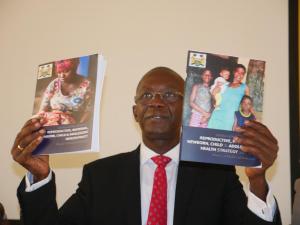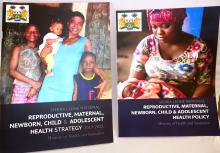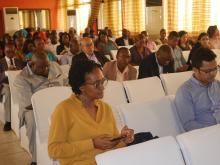New strategy launched to help tackle maternal, child deaths in Sierra Leone
FREETOWN, 6 November 2017 --- Today a new national five-year strategy and a policy for Reproductive, Maternal, Newborn, Child and Adolescent Health (RMNCAH) was launched in Sierra Leone, which aims to help reduce maternal and child deaths in the country.
Sierra Leone currently has among the highest rates of maternal and child mortality globally, as well as high incidence of teenage pregnancy. Current estimates suggest that up to 6 percent of women in Sierra Leone will die from maternal causes during their reproductive life. Based on the latest UN figures released, the country has an estimated under-5 mortality rate of 114/1000 live births which means that 1 in 9 children lose their life before their fifth birthday.
“Each year too many of our women and children are dying from causes which are largely preventable and treatable, and the Government has committed to doing everything in its power to overturn this tragic situation,” said Dr Santigie Sesay, Director of Reproductive and Child Health in the Ministry of Health and Sanitation, speaking at the launch event in Freetown. “Our new RMNCH strategy outlines practical interventions to save lives, improve the quality of care offered at our health facilities, address underlying causes of ill health and help ensure women, children and youth not only survive but also thrive and transform their communities.”
:This ambitious agenda will not be realized without the active support and engagement of our community champions, health workers at all levels, District Health Management Teams, the media, other Ministries, NGOs, the private sector, and our development partners and communities themselves,” he added.
Sierra Leone has registered good progress in some key areas of reproductive, maternal and child health. Lifesaving vaccines are reaching children and pregnant women across Sierra Leone, to prevent and tackle some of the leading infectious diseases. Attendance of at least four checkups during pregnancy increased from 56% to 76% over the previous strategy period; malaria treatment increased from 30% to 48%, and recent surveys show that levels of stunting among children younger than 5 years reduced from 37% to 29%.
The new Strategy outlines a number of critical areas for further action including: strengthening the quality of care offered at all levels of the health system, and improving access to services such as family planning; emergency obstetric and neonatal care; management of newborn and childhood illnesses at hospital and primary care levels; nutrition; prevention of teenage pregnancy; and water, hygiene and sanitation (WASH).
“WHO is proud to have supported the country in developing this strategy together with our partners, but we are also aware that this is just the beginning,” said Alexander Chimbaru, Officer-in-Charge of WHO Sierra Leone. “Everyone from communities to health workers, policy makers and the international community, has a role to play now in implementing the strategy, and ensuring women, children and youths are accessing quality health services that save lives.”
The Strategy, which has been developed with technical and financial support of the H6 Global Health Partnership including WHO, UNICEF, UNFPA and the World Bank Group; UKAid, and other health partners, aims to reduce the rate of maternal and child deaths by 45% and 55%, respectively, by 2021. These ambitious targets are needed to bring the country in line towards meeting the targets of the UN Sustainable Development Goals (SDGs).
For more information Contacts:
At the Ministry of Health and Sanitation
Kadri Koroma, +232 766 729 62, kadrikoroma [at] yahoo.com (kadrikoroma[at]yahoo[dot]com)
Solomon Rogers, +232 76 537835, solomonrogers [at] yahoo.comSolomon (solomonrogers[at]yahoo[dot]comSolomon)
At WHO
Saffea Gborie, +232 76 777 878, gboriesa [at] who.int (gboriesa[at]who[dot]int)
Laura Keenan, keenanl [at] who.int (keenanl[at]who[dot]int)





